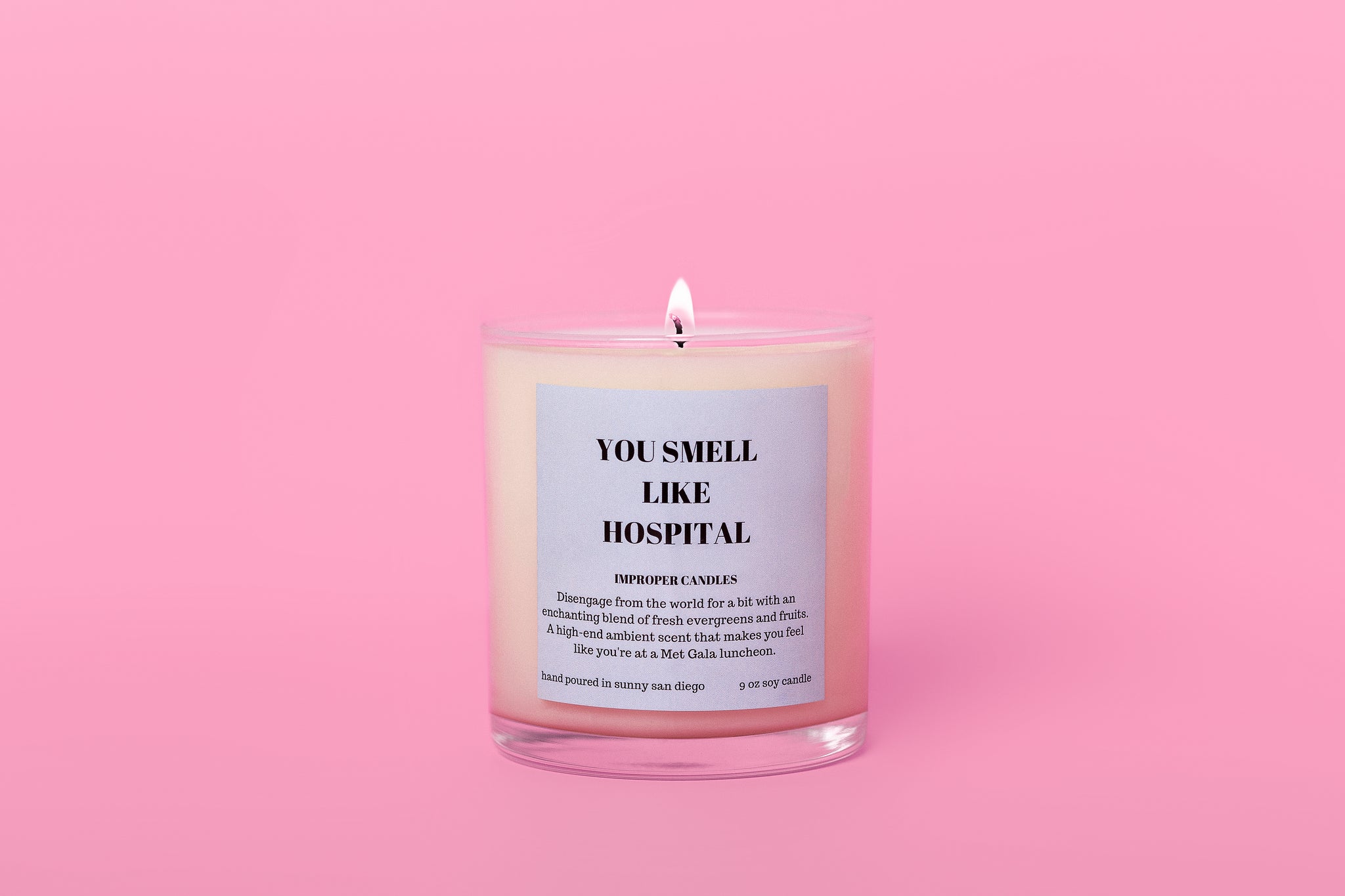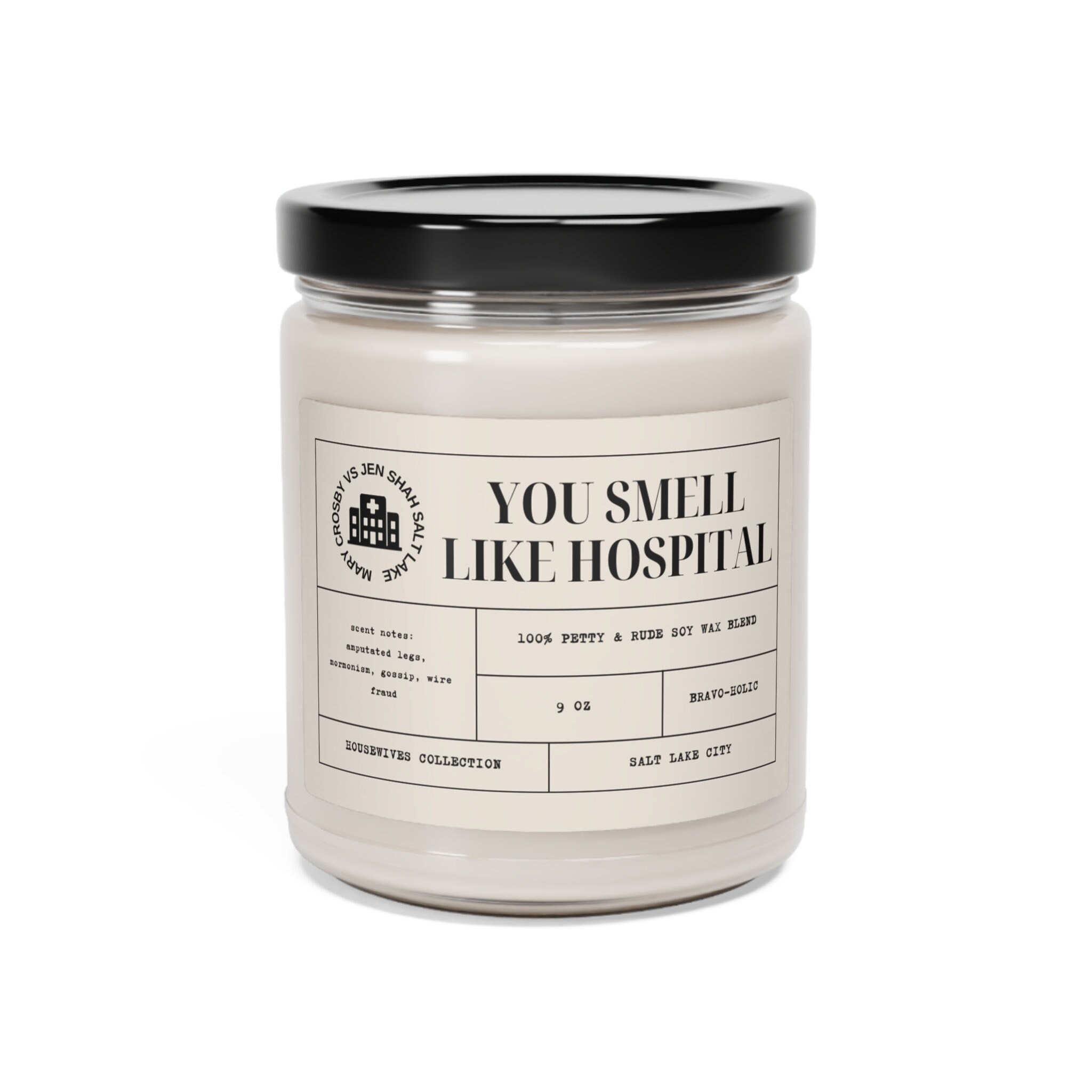Hey there, friend. Have you ever been in a situation where someone said, "You smell like hospital"? Let me tell you, it’s not exactly a compliment. That distinct smell of hospitals—antiseptic, disinfectants, and a mix of sterile cleanliness—can sometimes linger on clothes, skin, or even breath. But why does it happen? And more importantly, how can you get rid of it? Today, we’re diving deep into the world of hospital smells, their causes, and how to tackle them. So, buckle up and let’s explore!
This isn’t just about masking odors with fancy perfumes or air fresheners. We’re talking about understanding the science behind these smells, their impact on our daily lives, and practical solutions to keep you smelling fresh and confident. Whether you’re a healthcare worker, a frequent visitor to hospitals, or simply curious about this peculiar phenomenon, this article has got you covered.
By the end of this read, you’ll have a solid grasp of why "you smell like hospital" isn’t just a casual observation but a real issue that affects many people. And hey, who doesn’t want to smell amazing all the time? Let’s get started!
- Did Kendrick Lamar Play Basketball Exploring The Truth Behind The Mic And The Court
- Unveiling The Glamorous World Of Jz Styles Salon Reviews
Table of Contents
- What Does "You Smell Like Hospital" Mean?
- Common Causes of Hospital Smell
- The Science Behind Hospital Odors
- How It Affects Healthcare Workers
- Impact on Frequent Visitors
- Solutions to Get Rid of Hospital Smell
- Best Products to Use
- Prevention Tips
- Psychological Impact of Smells
- Final Thoughts
What Does "You Smell Like Hospital" Mean?
When someone says "you smell like hospital," they’re usually referring to that unmistakable scent of antiseptics, cleaning agents, and sometimes even the faint aroma of medicinal products. It’s not a pleasant smell by any stretch, but it’s also not something you can easily ignore. The phrase might come off as rude, but it’s often unintentional and based on the person’s sensory perception.
This smell can be particularly noticeable if you’ve spent a significant amount of time in a hospital environment. Whether you’re a doctor, nurse, or just visiting a loved one, the strong odors from disinfectants and medical supplies can cling to your clothes, hair, and even your skin. It’s like a shadow that follows you around, and trust me, it’s not something you want to carry with you all day.
Why Is Hospital Smell So Distinct?
Hospital smells are unique because they’re a blend of multiple factors. Think about it: hospitals are designed to be as clean and sterile as possible. That means lots of chemical cleaning agents, air purifiers, and even the smell of latex gloves. All these elements combine to create a distinct odor that’s hard to miss. And once it sticks to you, it can be tough to get rid of.
- How To Wash A Mousepad Like A Pro Ndash Keep It Clean And Fresh
- Yao Shaq The Rise Of A Phenomenal Basketball Legend
Common Causes of Hospital Smell
So, why exactly do hospitals smell the way they do? Let’s break it down:
- Disinfectants: These are the primary culprits behind that sharp, chemical smell. Hospitals use industrial-grade disinfectants to keep everything clean and germ-free.
- Medications: Certain medications, especially those used in treatments like chemotherapy, can have strong odors that linger in the air.
- Body Odors: Hospitals are places where people are often sick or injured, and their natural body odors can mix with the clinical smells.
- Ventilation Systems: While hospitals have advanced ventilation systems, they can sometimes trap odors rather than eliminate them.
These factors combined create a unique olfactory experience that can stick to you long after you’ve left the hospital premises.
The Science Behind Hospital Odors
Now, let’s dive into the science of why hospitals smell the way they do. It all comes down to chemistry. The disinfectants used in hospitals are often based on chemicals like bleach, ammonia, and alcohol. These chemicals are powerful enough to kill germs but can also leave a lasting impression on your senses.
When these chemicals evaporate, they mix with the air and settle on surfaces, clothes, and even your skin. The result? That lingering hospital smell that seems impossible to shake off. But here’s the good news: understanding the science behind these odors can help us find better ways to combat them.
How Do These Smells Affect Us?
Smells can have a profound impact on our mood and well-being. The hospital smell, in particular, can trigger feelings of anxiety or discomfort in some people. It’s not just about the nose; it’s about the mind-body connection. That’s why it’s so important to address this issue head-on.
How It Affects Healthcare Workers
For healthcare workers, dealing with the hospital smell is part of the job. Nurses, doctors, and other medical staff spend long hours in environments saturated with these odors. Over time, it can take a toll on their physical and mental health.
Imagine working a 12-hour shift surrounded by strong chemical smells. Not only does it affect your sense of smell, but it can also lead to headaches, fatigue, and even respiratory issues. That’s why many healthcare professionals rely on specific techniques and products to keep themselves fresh and odor-free.
Top Strategies for Healthcare Workers
- Change clothes frequently, especially after long shifts.
- Use fragrance-free soaps and lotions to avoid mixing scents.
- Invest in quality air fresheners or diffusers for personal spaces.
Impact on Frequent Visitors
If you’re a frequent visitor to hospitals—maybe because of a loved one’s health issues—you might also find yourself carrying that hospital smell home. It’s not just about the clothes; sometimes, the smell can seep into your hair or even your skin. This can be frustrating, especially if you’re trying to maintain a fresh and clean appearance.
For visitors, the solution often lies in being proactive. Carry a small bottle of hand sanitizer or a travel-sized deodorant to freshen up during your visit. And don’t forget to change your clothes as soon as you get home.
Tips for Visitors
- Wear breathable fabrics that are easy to wash.
- Use scented products sparingly to avoid mixing odors.
- Consider bringing a change of clothes for after your visit.
Solutions to Get Rid of Hospital Smell
Now that we’ve covered the causes and effects, let’s talk about solutions. How can you get rid of that pesky hospital smell once and for all? Here are some practical tips:
Wash Your Clothes Regularly: Use a high-quality detergent and add a fabric softener to neutralize odors. If possible, wash your clothes immediately after leaving the hospital.
Shower After Visits: A quick shower can do wonders for removing any lingering smells from your skin. Use a gentle soap and a refreshing body wash to keep you feeling clean.
Air Out Your Clothes: If you can’t wash your clothes right away, hang them outside or in a well-ventilated area to let the odors dissipate naturally.
Advanced Solutions
For those who want to go the extra mile, there are some advanced solutions worth considering:
- Ozone Generators: These devices can eliminate odors by breaking down the molecules responsible for the smell.
- Air Purifiers: Invest in a good air purifier for your home or car to keep the air fresh and clean.
- Essential Oils: Use essential oils like lavender or eucalyptus to mask unwanted odors and create a pleasant atmosphere.
Best Products to Use
When it comes to tackling hospital smells, having the right products can make all the difference. Here are some of the best options available:
- Fabric Fresheners: These sprays are designed to neutralize odors on clothes and fabrics.
- Deodorizing Beads: Place these beads in your closet or car to absorb unwanted smells.
- Charcoal Air Purifiers: These natural purifiers are great for removing odors without chemicals.
Remember, the key is to find products that work for you and fit your lifestyle. Don’t be afraid to experiment until you find the perfect solution.
Prevention Tips
Prevention is always better than cure. Here are some tips to help you avoid picking up that hospital smell in the first place:
- Wear protective gear like gloves or masks during your visit.
- Limit direct contact with surfaces that might carry odors.
- Carry a small bottle of hand sanitizer with you at all times.
By taking these preventive measures, you can significantly reduce your chances of bringing that hospital smell home with you.
Psychological Impact of Smells
Smells have a powerful effect on our emotions and memories. The hospital smell, in particular, can evoke feelings of anxiety, stress, or even sadness in some people. That’s why it’s so important to address this issue not just for physical comfort but also for mental well-being.
For many, the smell of hospitals is associated with illness or loss. By finding ways to neutralize or mask these odors, we can create a more positive and uplifting environment for everyone involved.
Final Thoughts
So, there you have it—a comprehensive guide to understanding and tackling the "you smell like hospital" problem. Whether you’re a healthcare worker, a frequent visitor, or just someone who wants to stay fresh and odor-free, the tips and solutions we’ve discussed can help you achieve that goal.
Remember, it’s not just about covering up the smell; it’s about addressing the root causes and finding lasting solutions. And hey, don’t forget to share this article with your friends and family. Who knows? You might just be helping someone else who’s struggling with the same issue.
Stay fresh, stay confident, and most importantly, stay healthy!
- Hairstyles For Dolls A Fun Guide To Transforming Your Dolls Look
- Corium Inversiones Honduras A Deep Dive Into Investment Opportunities In Central America


